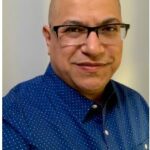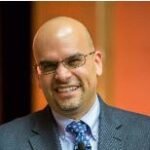Impact
El Futuro is North Carolina’s leading provider of accessible, bilingual, and culturally-responsive mental health services for the Latino community. We’re proud to know that our top source of referrals is friends and family members of current and former clients.
We’re also leading the way in training, technical assistance, and advocacy efforts to increase the quality and accessibility of bilingual and culturally-responsive mental health services in North Carolina and beyond.
True success to us is when our clients are able to thrive at home, school, and work, living out the dreams that brought them to our community in the first place.
*All numbers reflect data collected in FY2024
%
Clinical improvement or stabilization
People Served
a 13% increase over the previous year.
families attended greenspace or community events
a 99% increase over last year
people in our substance use treatment program
a 49% increase over last year
mental health providers and allied professionals participating in La Mesita Latinx Mental Health Professional Network
a 11% increase over the previous year
Mental health providers trained through La Mesita Program
Counties Served
people served through support and parenting groups and substance use workshop
%
Improvement in social and family roles
Sessions Provided
a 16% increase over the previous year
people served through Case Management
people served in walk-in clinic
Many of those we help have experienced sexual abuse, physical abuse, human trafficking, migration trauma, or other traumas associated with poverty and immigration. Thanks to our donors, we are able to help guide them toward a brighter futuro.
“The classes helped me stop drinking and that’s why I feel healthier. I’m very happy! The classes helped me make the necessary changes in my life and have a better relationship with my family.“
Cindy, our AmeriCorp Greenspace Coordinator met with a mom after “Niñitos de la Naturaleza” session. She shared: “today is the first day I am feeling comfortable enough to go out and be in an open space with others. My daughter had been through a big trauma 6 months ago and wasn’t feeling comfortable to be in public group settings, she didn’t feel brave enough to go out until today, thank you for this opportunity to see my daughter happy and free again.”
“I learned that the way you think is the way you feel and how you feel is the way you act. I learned that my thoughts were making me feel sad and I was going through life sad and angry. Now, even if I have worries, those worries aren’t as intense and don’t affect me as much because I can say ‘This is not as bad as it seems’ and that helps me a lot to feel better.”
“Raising our children in another culture presents challenges that are compounded by a diagnosis of ADHD. Having a support network and a space in which learning is done taking into account our cultural point of view is very valuable.”
“I have felt the change. I felt very angry with everyone, I was very resentful towards my daughters, I felt like my life was not worth living! But not now, thank God, everything is good, and thanks to the therapists who helped us, now I am very optimistic, and I will continue to stay like this!”
“So many times in our isolated work situations, we do not realize or are not aware of topics and information that these webinars/charlas bring to our skills and work. It is important to make efforts to enhance our skills and improve our constant awareness. These trainings are tremendously helpful and very user friendly and kind.”
Success Stories
“Letting Go with Love”
The unexpected death of their father was a crushing blow for this family. After 20 years of marriage she was suddenly a single, working mom struggling to keep the family together while numbed by grief. Her 6 year-old daughter was sad, irritable and isolating from others. Her youngest son was angry and struggling to understand that his “Papi” would never return home. A friend suggested they go to El Futuro for help.
At El Futuro they cried, laughed, grieved and found a safe space for mourning. As part of her therapy the daughter wrote a book called “Letting Go with Love” about the loss of her father, which she shared with her extended family. Now she is smiling again, her brother is able to sleep and their mom is able to work full time. Their perseverance and grace has been an inspiration for everyone at El Futuro.


“Growth”
When you’re 8 years old, you shouldn’t have to live in a homeless shelter with your mother and two siblings. You shouldn’t have to witness your dad abusing your mother. You shouldn’t have to go hungry. You shouldn’t have to get picked on for crying in class. Three years ago others saw him as too sensitive and a behavior problem. His mother brought him to El Futuro with the hope of getting him help for the problems she also knew very well – depression, anxiety and post-traumatic stress. Now, after therapy and treatment with medication, he has found his voice and his mother glows with joy when she speaks of how he has grown. The family now lives in a small duplex. They spend weekends at the park. He can sleep through the night with no nightmares and is kind to his younger brother. His school celebrates his progress as well. He made the A Honor Roll and received the Principal Award. His mother also found help at El Futuro and feels proud of her children and is reaffirmed as a mom. She says, “Ahorita me quiero yo, porque antes no me quiero yo.” (Now I like myself, before I didn’t.)
“Smiling and laughing”
She slumped in her chair with her head down the first time she came to El Futuro. She felt sad, worried and didn’t know who to trust. The obsessive thoughts and ritualistic behaviors caused her to not eat or sleep. She stayed away from friends and stopped trying at school. Her parents found help at El Futuro and now, several months later, she is smiling, attending school and laughs with her little sister.


“Martha and her father along together”
Martha’s father came to El Futuro because she had ADHD and was showing significant signs of anxiety. Martha and her Dad were not getting along, and she was having trouble paying attention and attending school. Virtual learning created a huge challenge and the whole family was struggling with the scenario. After receiving both psychiatry and therapy through telehealth with El Futuro, El Futuro’s Executive Director and one of our psychiatrists, Dr. Smith, ran into Martha working with her Dad at his business locally. Martha’s Dad was so proud that they were getting along and that she is now willing to help out. He shared that she’s also applying herself in school and doing better with virtual learning, and the strains have decreased for the whole family as a result. In the meantime, Martha’s Dad has been attending the ADHD parent support group (El Faro), and has developed new supporting and coping skills himself, in addition to meeting other parents and gaining a new sense of solidarity and support. The whole family is doing better as a result, despite the ongoing challenges of COVID.
“Hope for Ana”
Ana was a mother of three young children. Although it was very cold outside, Ana didn’t want to wait inside our clinic for her ride, because she didn’t want her husband to know where she and her children were. Wary of suffering more domestic violence if he found out, Ana left into the cold dark.
Ana received help from El Futuro and after her treatment she didn’t lose hope of making a better life for her family.
A year later, we talked with Ana and she had changed a lot. Ana’s husband started receiving alcohol and substance use treatment at El Futuro that year, and he learned how to control his temper when he feels disrespected or frustrated. Ana felt more hopeful and less depressed, her nightmares ended, and she made new friends. Ana’s 10-year old son now smiles and talks about his friends at school.


 Alvely Alcántara, LCSW
Alvely Alcántara, LCSW Rossy C. Garcia, MEd
Rossy C. Garcia, MEd  Katy Sims, MD
Katy Sims, MD  Everardo Aviles, LCSW, LCAS (Eve)
Everardo Aviles, LCSW, LCAS (Eve) As a medical anthropologist and social work researcher, Dr. Gulbas’ research embodies interdisciplinarity through the integration of applied theories of health and human development with qualitative and ethnographic methodologies. Her work seeks to understand how people—children, families, and providers—navigate complex sociocultural landscapes in the pursuit of mental health. Most of her work, to date, focuses attention on developing more robust interpretations of suicide risk. With funding from the National Institutes of Mental Health, this body of research has contributed to advancements in theoretical and empirical knowledge of the broader contexts within which youth suicide risk is situated.
As a medical anthropologist and social work researcher, Dr. Gulbas’ research embodies interdisciplinarity through the integration of applied theories of health and human development with qualitative and ethnographic methodologies. Her work seeks to understand how people—children, families, and providers—navigate complex sociocultural landscapes in the pursuit of mental health. Most of her work, to date, focuses attention on developing more robust interpretations of suicide risk. With funding from the National Institutes of Mental Health, this body of research has contributed to advancements in theoretical and empirical knowledge of the broader contexts within which youth suicide risk is situated.  R. Gabriela Barajas-Gonzalez is a developmental psychologist and an assistant professor of Population Health at NYU Grossman School of Medicine. Dr. Barajas-Gonzalez is the principal investigator of a study that examines the impact of immigration-related threat and stress on school communities. She earned a PhD in developmental psychology from Columbia University and hold a BA in human biology from Stanford University. Dr. Barajas-Gonzalez is the daughter of Mexican immigrants and a first gen college student.
R. Gabriela Barajas-Gonzalez is a developmental psychologist and an assistant professor of Population Health at NYU Grossman School of Medicine. Dr. Barajas-Gonzalez is the principal investigator of a study that examines the impact of immigration-related threat and stress on school communities. She earned a PhD in developmental psychology from Columbia University and hold a BA in human biology from Stanford University. Dr. Barajas-Gonzalez is the daughter of Mexican immigrants and a first gen college student. Dr. Parra-Cardona is an Associate Professor in the Steve Hicks School of Social Work (SHSSW) at the University of Texas at Austin. At the SHSSW, he serves as Coordinator for Mexico and Latin American initiatives. He also serves as Area Director for Research at the UT Austin Latino Research Institute. Dr. Parra-Cardona’s program of research is focused on the cultural adaptation of evidence-based parenting interventions for low-income Latinx populations in the US and Latin America.
Dr. Parra-Cardona is an Associate Professor in the Steve Hicks School of Social Work (SHSSW) at the University of Texas at Austin. At the SHSSW, he serves as Coordinator for Mexico and Latin American initiatives. He also serves as Area Director for Research at the UT Austin Latino Research Institute. Dr. Parra-Cardona’s program of research is focused on the cultural adaptation of evidence-based parenting interventions for low-income Latinx populations in the US and Latin America. Bianka Reese, PhD, MSPH is a research scientist and program evaluator specializing in adolescent and young adult sexual and reproductive health. Her previous research in the experiences of Latinx LGBTQ+ youth stems from her work as the Research and Evaluation Manager at SHIFT NC (Sexual Initiatives For Teens), where she led largescale evaluations of multilevel, community-based sexual health promotion initiatives and research projects aimed at elevating the voices of diverse youth in North Carolina. Dr. Reese is currently the Senior Research Strategist at Creative Research Solutions, LLC, an award-winning national evaluation, research, and assessment firm.
Bianka Reese, PhD, MSPH is a research scientist and program evaluator specializing in adolescent and young adult sexual and reproductive health. Her previous research in the experiences of Latinx LGBTQ+ youth stems from her work as the Research and Evaluation Manager at SHIFT NC (Sexual Initiatives For Teens), where she led largescale evaluations of multilevel, community-based sexual health promotion initiatives and research projects aimed at elevating the voices of diverse youth in North Carolina. Dr. Reese is currently the Senior Research Strategist at Creative Research Solutions, LLC, an award-winning national evaluation, research, and assessment firm. Tania Connaughton-Espino, MPH is an independent researcher focused on adolescent and young adult sexual and reproductive health. Her interest in the experiences of Latinx LGBTQ+ youth stems from her previous work with SHIFT NC (Sexual Initiatives For Teens), where she led the training and evaluation department, conducted capacity-building workshops for youth serving professionals including on the topic of how to be more affirming of LGBTQ youth, and from her extensive experience working with the Latinx population in NC.
Tania Connaughton-Espino, MPH is an independent researcher focused on adolescent and young adult sexual and reproductive health. Her interest in the experiences of Latinx LGBTQ+ youth stems from her previous work with SHIFT NC (Sexual Initiatives For Teens), where she led the training and evaluation department, conducted capacity-building workshops for youth serving professionals including on the topic of how to be more affirming of LGBTQ youth, and from her extensive experience working with the Latinx population in NC. Maru Gonzalez, EdD is an Assistant Professor and Youth Development Specialist in the Department of Agricultural and Human Sciences at North Carolina State University. Her areas of inquiry include youth development with a focus on activism, social justice, and the experiences of LGBTQ+ young people across familial, school, and community contexts.
Maru Gonzalez, EdD is an Assistant Professor and Youth Development Specialist in the Department of Agricultural and Human Sciences at North Carolina State University. Her areas of inquiry include youth development with a focus on activism, social justice, and the experiences of LGBTQ+ young people across familial, school, and community contexts.  Nayeli Y. Chavez-Dueñas, PhD
Nayeli Y. Chavez-Dueñas, PhD Hector Y. Adames, PsyD
Hector Y. Adames, PsyD